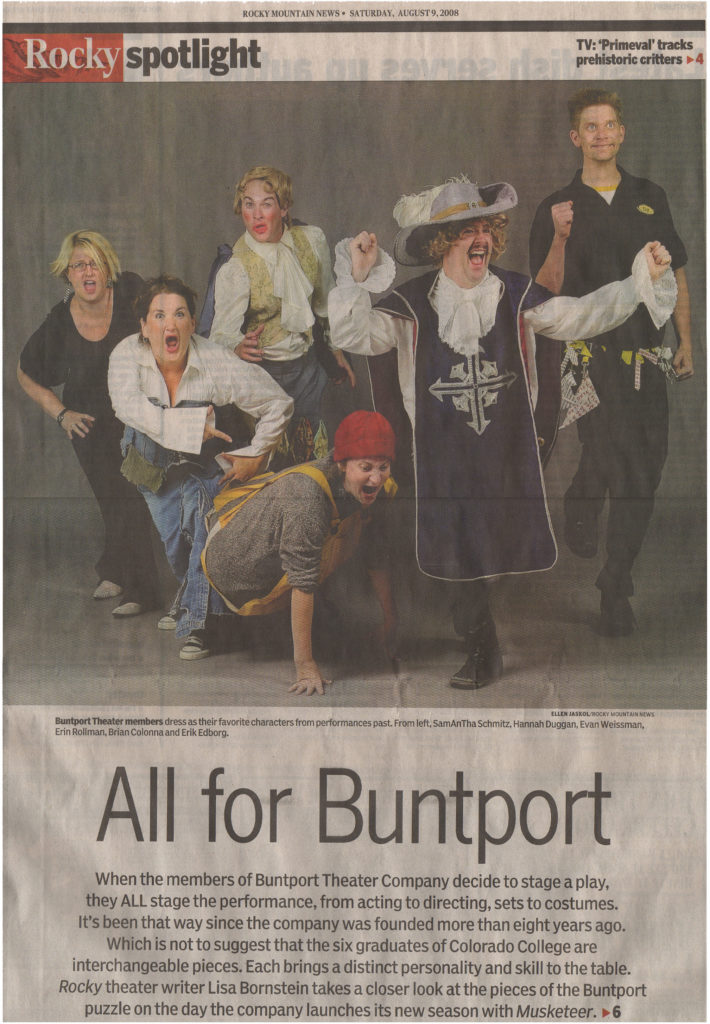
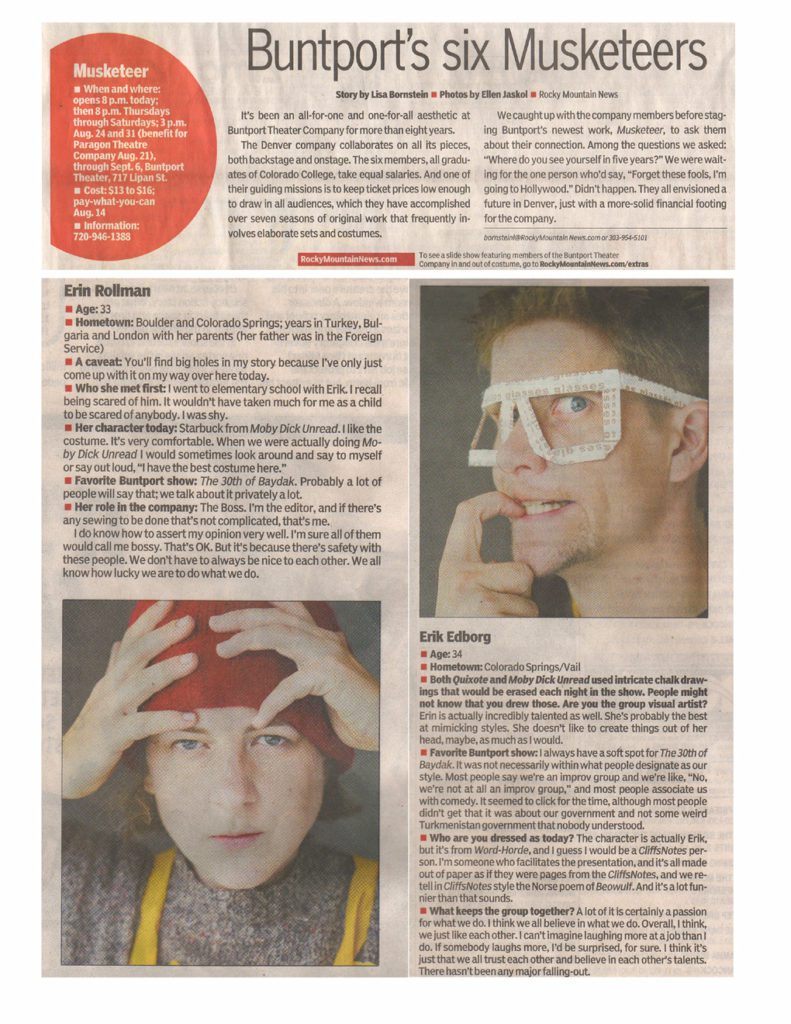
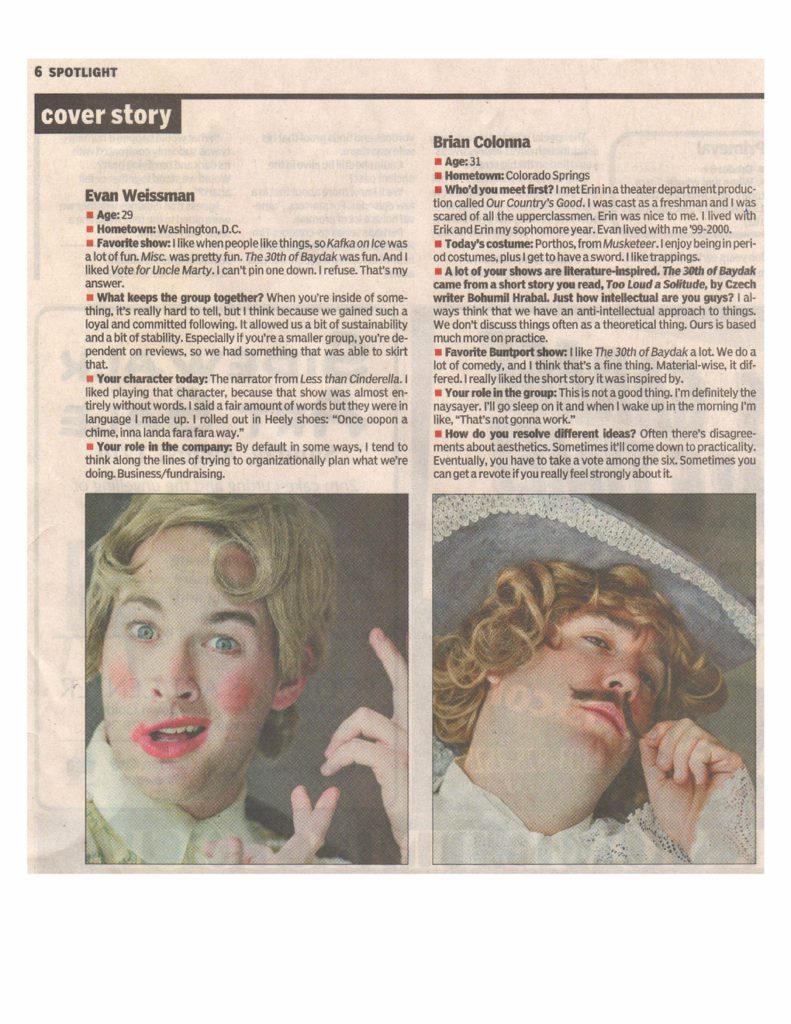
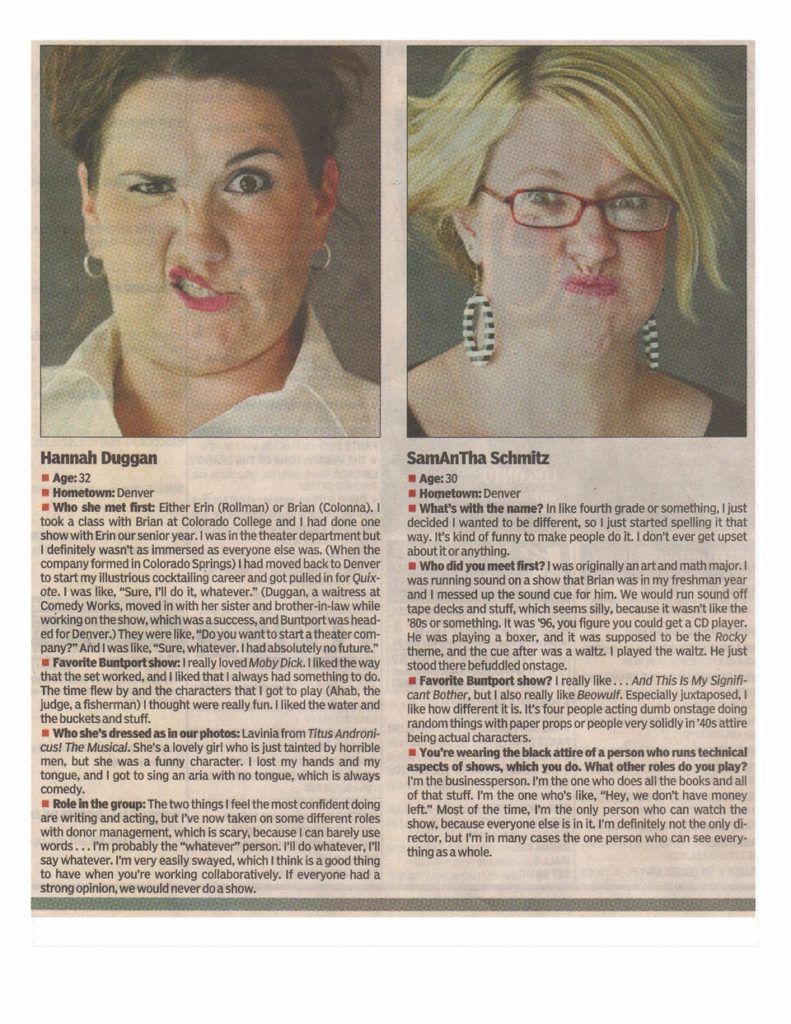




Some might be a bit off-put to read that a theater company is adapting an absurd 1835 Ukrainian short story that scholars have classified as “grotesque realism.”
Don’t be frightened … It’s Buntport!
That means it’ll be inventive, accessible and, yes, even fun.
“The Squabble” typifies all the qualities that make Buntport a singular company. It unearths an obscure source story and transforms it with intelligence and affability, using mind-expanding storytelling techniques along the way.
The Buntport ensemble has told its many original stories on fake ice, suspended above the stage and even upside down …
“The Squabble” is performed in a 12-foot-by-19-foot mud pit.
Yep, 5 cubic yards of wet, sloppy mud. Sure, it’s a gimmick – with a purpose. Just hearing the players trudge through their trough creates sounds that add real, visceral pleasure to the tale.
“The Squabble” is based on Nikolai Gogol’s fable, “The Tale of How Ivan Ivanovich Quarreled with Ivan Nikiforovich.” Our setting is a village called “World Town” – think of it as Ukraine’s “Our Town.”
Gogol wrote bizarre tales, like the one about a nose that detaches itself from a soldier’s face, intent on living an independent life. Here, he gives us villagers who are content to live in what they call “a magnificent puddle.”
World Town, populated with names like Wanda Wickerstickly, is a harmonious place with no theft or acrimony. That is, until a great friendship between two neighbors is torn asunder when one casually calls the other a “goose.” This innocuous epithet builds, like the butterfly effect, into a sad storm of acrimony that draws the whole town into their down and dirty mess.
Bob Boxinoxingworth (Erik Edborg) and Bob Luggalollinstop (Brian Colonna) are opposite halves of a whole. One’s lanky, clean and proper. The other’s rotund, blunt and kind of gross.
Their tale is told in Brechtian style, so our narrator (a well-spoken pig played by Evan Weissman) and other ensemble characters (played by Hannah Duggan and Erin Rollman) watch along with us in plain view with props and costumes.
The mud pit is more than a visual and auditory novelty. But don’t come looking for wrestling. It’s not a playpen, but a character unto itself.
This is not terribly deep terrain (the pit or the story), but it’s always a pleasure to sit back and watch what grows whenever Buntport simply … adds water.
Here we meet endearingly bizarre characters like Duggan’s Monty Python-worthy judge, Alfred Fredfredfredful. We see Wanda dronishly pin dirty rags to clotheslines hung along both rows of seats, furthering the idea that life here is simply impossible to keep clean.
Still, chins are up.
You won’t understand everything Buntport puts before you. (Who ever does?) But when you combine these delightfully feuding neighbors with the players’ whimsical storytelling style and there’s just something very “Fantasticks” about the whole, brief evening.
And fantastic.
-John Moore, May 22, 2009, Denver Post
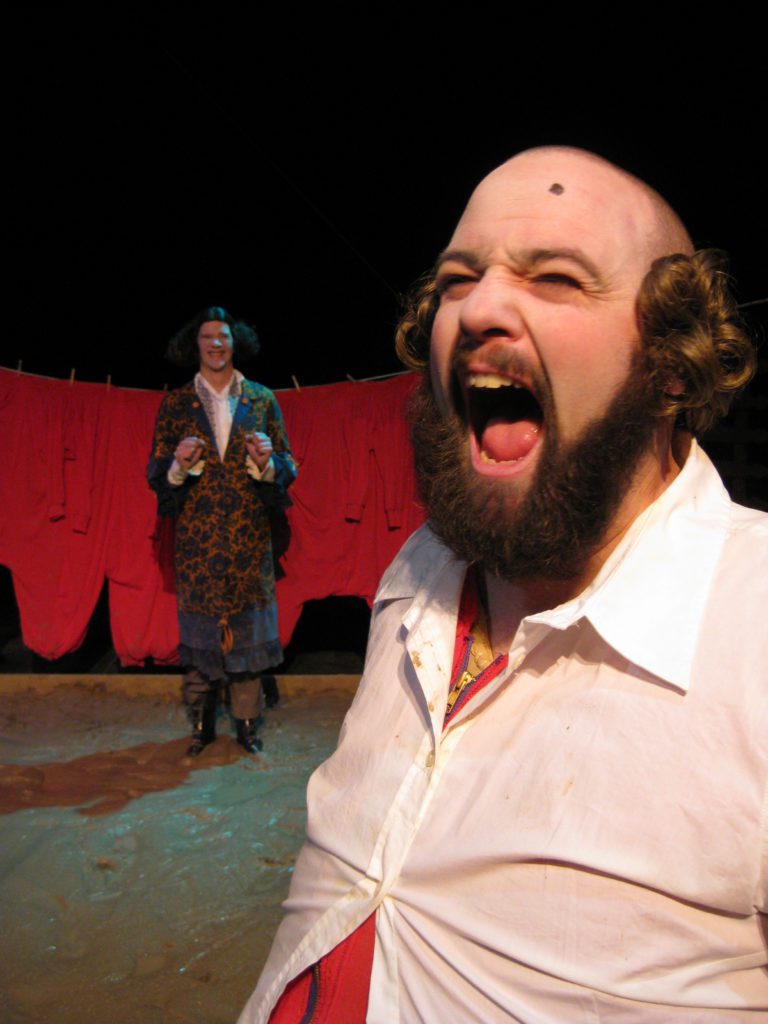
Denver’s Buntport Theater produces interesting, entertaining work. That may sound simple, but it’s an objective few artists or arts groups ever achieve. They achieve it again with the final play of their eighth season, “The Squabble,” with an unmistakable and unstale Buntportian approach. If you want to enjoy yourself at the theater, this is the one you should be attending.
Here are more remarkable facts about Buntport. They do good work consistently. They are without pretense. They are committed to working here. They work collaboratively.
They are a little tiny Utopian island for me, really, floating in a sea of self-indulgence, bad choices and egomaniacal hobbyism. Which is why I am so biased in their favor. Caveat lector.
The creative sextet – Erik Edborg, Brian Colonna, Evan Weissman, Hannah Duggan, Erin Rollman, and SamAnTha Schmitz – have produced 26 shows together to date, by their count. They have staged unusual fare such as “Kafka on Ice,” Moby Dick Unread,” and “The Odyssey: A Walking Tour.” You could say it’s a little gimmicky – or you could say it’s no-holds-barred. The group is unafraid and unashamed to use whatever techniques help them reach the audience.
The physical setup for “The Squabble” resembles nothing so much as the ring for a messy wrestling match. It’s a rectangular box containing several cubic yards of mud. The ensemble (save for SamAnTha, who handles the offstage functions) treads through the muck, acting out an adaptation of the source material, a short story by Gogol.
The mud is an obvious metaphor for the conflict the protagonists, here named Bob Boxinoxingworth (Edborg) and Bob Luggalollinstop (Colonna), find themselves, er, mired in. It also gives the troupe plenty of dirty laundry to hang out on the clothesline framework that lines the perimeter of the action and extends up into the seats.
It reflects the identifying imagery that places the story in a jerkwater town in Imperial Russia – a “lake” that is a Main Street puddle, a town that’s proud of the evenness of its roofline, and a populace of supercilious idiots that are conscientious mainly of the freshness of their breaths.
Rising from this background like cardboard cutouts are the two Bobs, who share pedantic obsessions and spasms of covetousness, and who finally clash over Bob L.’s use of the pejorative term “goose.” Bob B pivots and fidgets himself into a frenzy, while Bob L (Colonna doesn’t take the low road in his fat suit), sways menacingly, to hilarious effect.
The fable of their feud, which ripples outward in effect until the entire village is temporarily consumed by it, is narrated by a rather well-spoken pig (Weissman) who is clever enough to both make witty observations and avoid being turned into sausage. Weissman’s turn as the identically-named but one-eyed simpleton Bob Boxinoxingworth is equally pleasing.
Rollman plays out an unrequited romance with herself. She’s both the contentious, ever-ironing Wanda Wickerstickly and the chief of police, Peter Apropopanoosh, complete with Pythonesque walk and accent, that Wanda seems to favor . . . when she’s not shrieking the overture to “Carmen” (everyone seems to have his or her classic theme, which murmurs out of their mouths add odd times). Duggan has cartoony fun with the characters of town nudnik Tony Tumblestumpington and magistrate Alfred Fredfredfredful.
Anyone who might object to wacky and surreal nature of the proceedings doesn’t know how to take a spat with a grain of salt. The former friends spurn reconciliation, and their bickering moves into the realm of actual litigation. Anyone familiar with the world of legal machinations will recognize how that kind of thing throws even the best-intentioned lust of vengeance into a flaccid torpor.
The bickering ossifies into a dimly remembered grudge. The search for legal satisfaction becomes a quasi-religious hope for deliverance. The rain keeps falling; the town rots away in the mud.
That Buntport can make us laugh so heartily while keeping the edge of melancholy keen keeps the larger perspective about childish behavior with us. Seeing “The Squabble” won’t solve the world’s problems, but it sure casts a fresh light on our roles in perpetuating them.
-Brad Weismann, May 26, 2009, bradweismann.blogspot.com
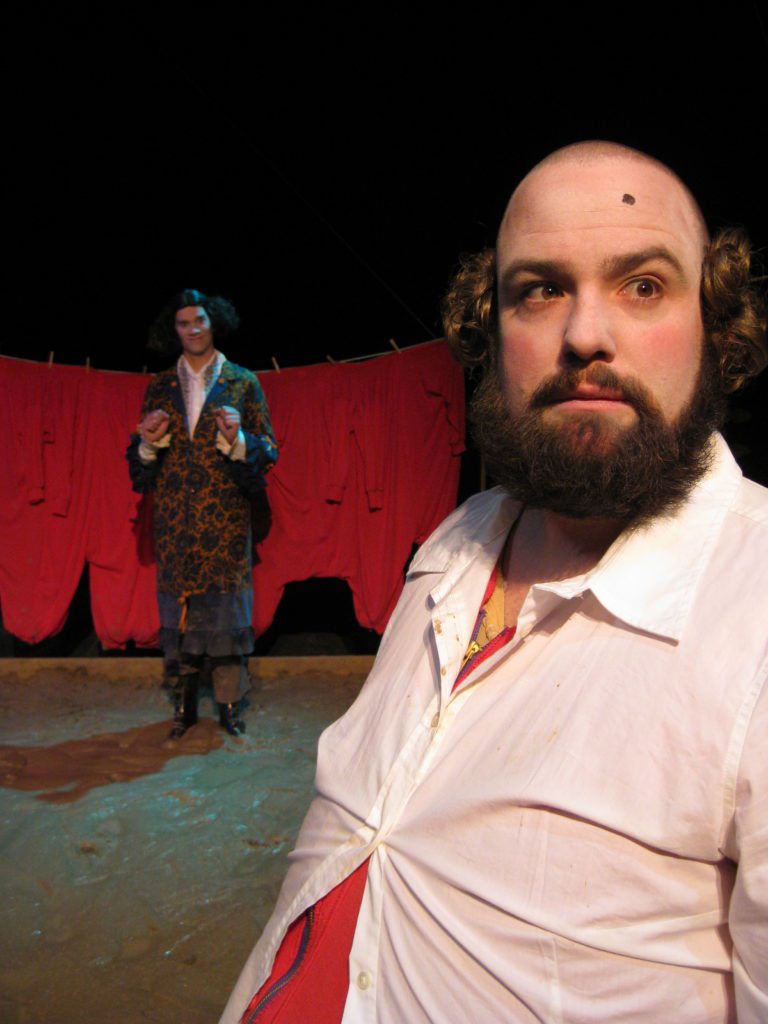
Finding the humor in such behavior comes naturally to Russia’s impressive stable of scribes, but its basis is not always apparent to outsiders, as we so often see in angst-ridden, hand-wringing productions of Chekhov. But the creative font of theatrical talent that calls itself Buntport Theatre has no such difficulties in mining the comic and, at times, absurd from the Nikolai Gogol tale they have adapted into a barnyard allegory.The Russian temperament is as enigmatic as the country from which it arises, an unpredictable roller coaster of joy and melancholy, charity and self-interest, that somehow provides the temerity to see its hardy stock through the harshest winters with a ferocity that is willing ultimately to destroy its own resources to outlast the likes of Napoleon and Hitler.
Smack dab in the middle of the company’s flexible space sits approximately 500 square feet of mud held in check by a sturdy frame of two-by-eights – within which most of the action takes place, with the actors wearing rubber boots to navigate the slop – which along with clotheslines and picket fences that demarcate settings, serves as two abodes, surrounding yards, a courtroom, and the town square.
“Wallowing in the mire” and “airing dirty laundry” are two metaphors that come to literal fruition as the plot unfolds: two good friends start feuding for the slimmest of reasons and refuse to forgive each other, even as death approaches.
As always, the company’s characterizations are a hoot, beginning with the main adversaries: Erik Edborg as the well-mannered but easily offended, willowy Bob Boxinoxingworth and Brian Colonna as the ill-bred and blunt, torpid Bob Luggalollinstop. The intriguing question of how these fellows ever got to be friends in the first place is quickly marginalized as we watch Bob B and Bob L project their worst fears on each other.
The Bobs are enabled in their maledictions and reprehensible behavior by Wanda Wickerstickly, a delightfully eccentric and abrasive Erin Rollman, who encourages Bob L and infuriates Bob B. Rollman then turns state’s witness, reappearing as Peter Apropopanoosh, who along with Hannah Duggan’s equitable Alfred Fredfredfredful, the local judge and owner of the town’s largest house, attempt to leverage the law to ameliorate the situation.
Duggan’s alter ego, the delightful simpleton Tony Tumblestumpington, is the harmless, homeless flip side of the judge, who spreads her requests for evening shelter relatively equally between the Bobs. Evan Weissman, as Pig and as One-eyed Bob B stands inside and outside the story, mocking the sad state of affairs to which he is both a partner and an observer.
In the program, the company notes that Gogol’s unique blend of humor and fun resonates with their own work, which is certainly evident in the production. There is one other striking similarity to many of Buntport’s dramas or allegories: the lack of catharsis. In comedy, a series of good laughs is sufficient to provide a transformational catalyst, but The Squabble is not a comedy in structure or tone. It could be argued that this was Gogel’s intention – to let the unresolved issues fester without tragedy or redemption – and perhaps the Russian temperament finds succor in such a point-of-view, but this side of the Cyrillic alphabet, an emotional Rosetta stone is required.
-Bob Bows, May 22, 2009, ColoradoDrama.com
Partway through The Squabble, I did something I’ve never done before in all my years of faithful and happy attendance at Buntport: I glanced at my watch to see how much longer we had to go.
Reading Gogol takes an imaginative effort: You have to try to transport yourself into his time and place, guess at the manners, politics and culture he’s mocking and adjust to his humor. (Someone once said that reading literature in translation is like making love through a blanket; I think this is particularly true of jokes.) Instead, Buntport has transported the action to some fictive and unnamed place that feels as if it’s halfway between the United States and nineteenth-century Europe. The Ivans have become Bob Boxinoxingworth and Bob Luggalollinstop; narration is provided in part by the former’s pig. But this effort only occasionally captures the flavor of the original, and the updated humor that the company’s inserted – the names, for example; jokes about mints and bad breath substituted for observations about snuff – aren’t that funny. In a concept that could have been inspired, all the action takes place in a huge trough of real mud – Buntport’s version of Gogol’s “truly magnificent puddle” – on which the actors tromp, shove each other and sometimes skid. They wipe their boots continually on squares of cloth, which then get pinned onto moving clotheslines. You can see what the company is going for: a representation of the mean, mud-bound spirit of the little town where pigs and chickens wander the streets, and also of the mud-wrestling between the protagonists. But though the mud provides some good bits of business, particularly for the fastidious Boxinoxingworth, it’s not really integrated with the action. Nor is your very natural desire to see everyone finally scrambling and wrestling in it ever satisfied. Even though there’s no mud fight in the original story and it would be hell on costumes, why provide such a tempting, squishy mess if you’re not going to go all the way?Based on Nikolai Gogol’s “The Tale of How Ivan Ivanovich Quarreled with Ivan Nikiforovich,” The Squabble tells the story of two neighbors in a Ukrainian village who begin as inseparable companions and become deadly enemies over a meaningless epithet flung by one at the other. The original is grotesque, odd and almost surreal, poking fun at rural society, legalism, bureaucracy and human nature. There’s a nod to Romanticism, including a narrator who apologizes periodically for not being more poetic, and the characters are broadly and absurdly sketched.
Erik Edborg and Brian Colonna certainly go all the way in the main roles. These two actors create characters that are fully articulated and insanely funny. Colonna, hugely padded, is a man almost immobilized by his own girth, but makes up for it with a booming voice and an almost desperate air of authority. (Colonna usually gives his characters high, heady voices, so this is an interesting change.) And I can safely say you’ll never see anyone in life or again on stage who even faintly resembles Edborg’s Bob Boxinoxingworth. Wearing a girlish curly wig and absurdly decorated coat, as thin as Luggalollinstop is fat, he’s epicene without being effeminate in any of the usual ways, and his crazed and precise mannerisms are an astonishment. While these two are engaged in their quarrel, you’re riveted.
No one else has created a character this specific, however, and Evan Weissman, Erin Rollman and Hannah Duggan, each playing two roles, end up scuttling around the stage, making faces, using funny voices, gesticulating and wearing silly wigs. Rollman, in particular, seems to be utilizing sketch-comedy characterizations: Both the people she portrays have irritatingly shrill voices; neither speaks as if thinking the words before saying them. The Buntporters are hugely talented, among the most hilarious performers around. Surely they know that nothing kills comedy as fast as trying to be funny.
It’s very possible that Gogol is unstageable; in any case, mixing the nineteenth-century Russian writer with Buntport’s comic sensibilities simply never jells. A satire, the story has no forward momentum – and on stage, as with the original – it grinds to a sad, inevitable halt. Just not soon enough for me.
-Juliet Wittman, May 27, 2009, Westword
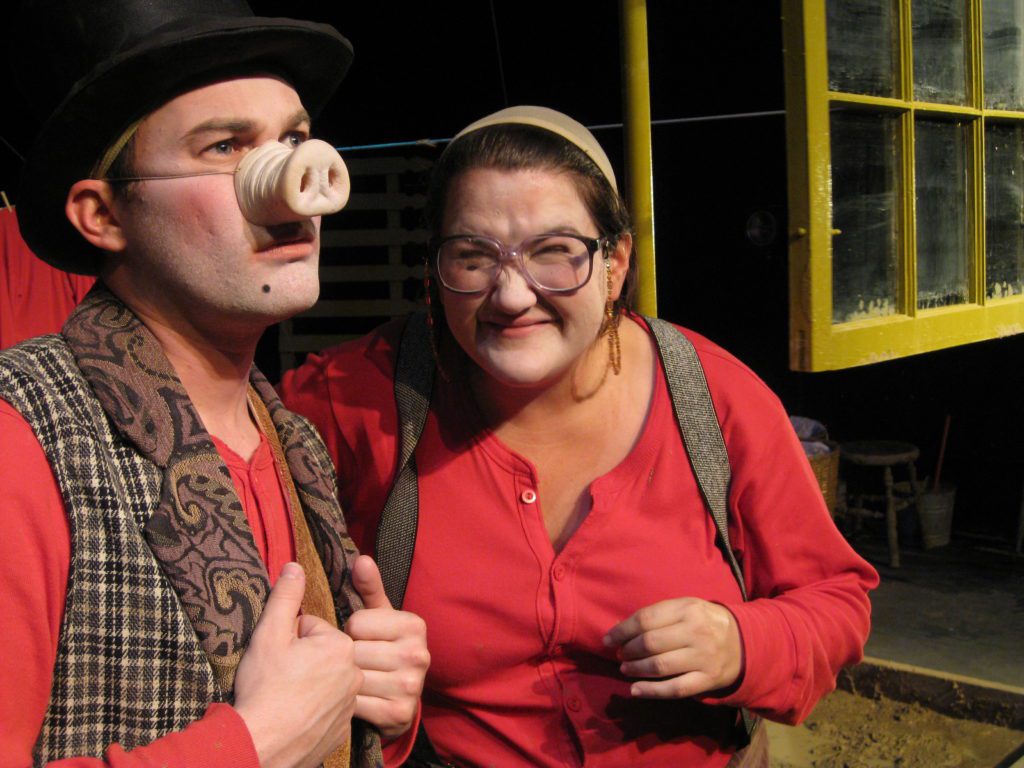
THERE WILL BE MUD
Two fast friends cause chaos in a small village by blowing most things way out of proportion. Based on the Gogol short story. (more…)

The talented folks at Buntport Theater have set their sights on musical theatre, creating their first all-original musical (their now legendary musical version of Titus Andronicus was based on Shakespeare, after all). They have taken the U.S. Postal Service as their “central metaphor for interconnectedness,” and built Seal. Stamp. Send. Bang. The result is a fun, funny, clever, unpredictable, and entertaining musical.
Seal. Stamp. Send. Bang. is the story of how the lives of eight characters intertwine. Several of them work for the Postal Service, and the mail plays a pivotal role in most of the surprising twists and turns the story takes. While there is a plot, this production is more about characters and relationships than storyline. Each new revealed connection between characters completes a piece of the story, until everything comes together by the end.
The script is what we expect from Buntport – an interesting story with diverse and well-developed characters that create unexpected situations and outcomes. Adam Stone has injected clever lyrics and synth-pop music that fit the story and the characters singing them well. The funniest number involves a singing and dancing package.
The production is well directed, though as with everything Buntport, direction is a collaborative effort. The timing is tight, perfect for quick comedy, and the constant details and small creative bursts seem limitless. The songs are integrated into the action on stage well, without any pretentious buildup or false theatricality.
Erin Rollman anchors the show as Susan, a cheerful, exuberant, optimistic mail carrier. The unlikely corner of a love triangle based on misunderstandings, she is happily oblivious to much of what goes on around her. Jason, played by Erik Edborg, is compulsive and voyeuristic as he deals with “dead letters” that can’t be delivered. Edborg captures the essence of someone trapped inside an office, constantly looking at other people’s mail, but officially only enough to get a delivery address. Brian Colonna is Richard, the sadistic yet mousy security enforcer, always looking to catch someone doing something wrong. Daphne, played psychotically by Hannah Duggan, is a woman on the edge. She is seething with anger, but the expression of that anger is annoying and, well, just weird – but hilariously so. Rounding out things on stage is Evan Weissman, playing all the other roles needed. As Ethan, he is sheepish and infatuated, but unable to express his love directly. But he transforms himself completely into several other characters as well.
The set is modular and integrated well into the show, with several different homes transforming into offices, interiors, or mail trucks when needed. The lighting is clever, much more of an element than in past Buntport shows. I particularly liked the creative follow spot use, run deftly from the booth by SamAnTha Schmitz. The costumes were appropriate, with each helping to reinforce the character wearing it. This show also called for a higher level of sound integration, which worked well for the most part. The transition in mid-song from full reinforcement to a simulated Walkman sound was very clever.
Seal. Stamp. Send. Bang. is just plain fun. The music is interesting and enjoyable, the choreography is silly and a wonderful parody of musical theatre, and the hilarious story twists will catch you off guard. The play is about interconnections and misconnections, and while there may not be as much depth or insight as in recent Buntport offerings, that doesn’t matter. This show is about fun, comedy, and entertainment, and it hits that target squarely on the bulls-eye.
—Craig Williamson, March 19, 2009, North Denver Tribune
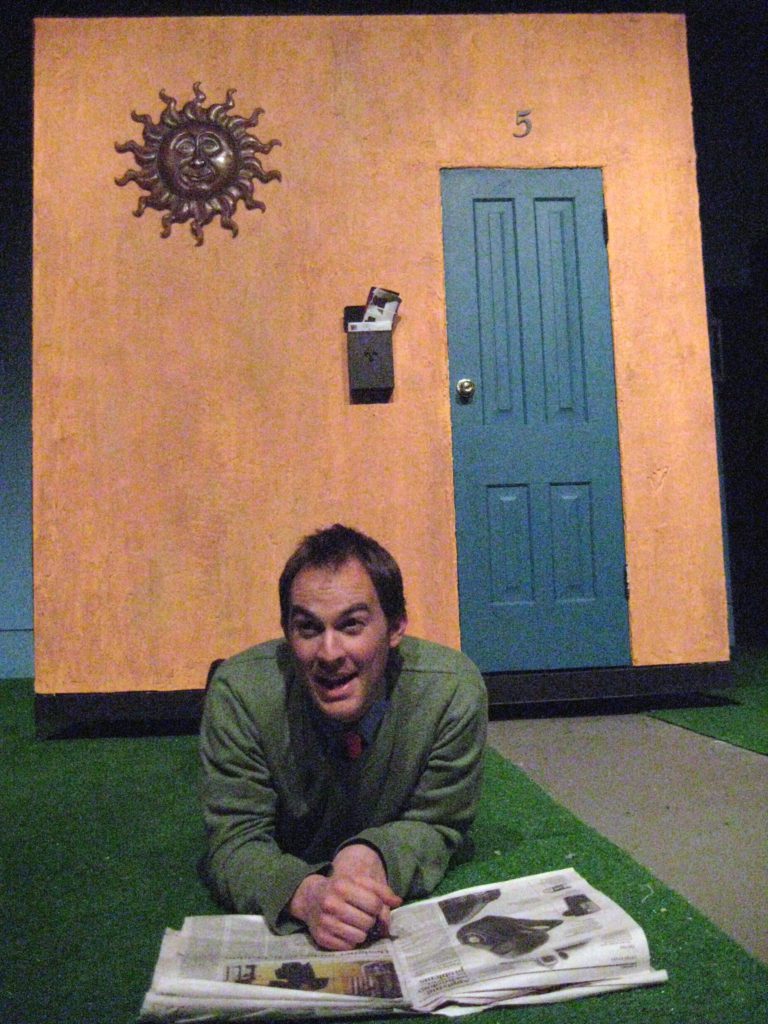
Susan, a mailwoman played by Erin Rollman, finds little meaning in her profession – but a lot of significance in the splat of birdshit on her windshield. Lovingly framing it with her fingers, she declares the thing “a bird poop angel” and bursts into a rapturous, American Idol-style song of celebration. Pete loves Susan and has a mystical belief in the mail – the way it weaves through space, binding disparate people together. He’s given to popping unaddressed postcards into the mailbox because he knows they’ll pass through Susan’s hands, and surely she’ll eventually realize they’re meant for her. Except that ethical Susan, realizing no such thing, simply follows postal regulations, depositing the cards unread at the dead-letter office – where lonely, eccentric Jason believes they represent a set of cryptic messages from Susan to him.
Very sweet so far, eh? But the plot darkens, and madness, torture and bombing come into play. Not to mention Tennyson quotations, Michael Landon, a bucolic lake, family feuds, eggs shaped into logs and spontaneous combustion.
Seal. Stamp. Send. Bang. is Buntport’s first real musical. Although the company transformed Shakespeare’s Titus Andronicus into a musical some years ago, that just set new lyrics to existing tunes. For this original play, the Buntporters enlisted local composer Adam Stone, and he’s come up with a feast of synth-pop songs: tinkly, bright melodies; big-bodied solos; hilarious patter. Although the production emphasizes the artificiality of the form – at intervals, each actor carefully centers him or herself in the spotlight – it isn’t a straightforward parody. Nor is it an homage. This is just what happens when Buntport applies its unique approach and set of sensibilities to a musical.
The actors’ brilliance doesn’t stop when the singing does. They’re terrific with the dialogue, too, sending non sequiturs, oddball observations, ingenious connections and misconnections fizzing and fountaining through the air like jugglers’ balls – “A man should fish when he’s got ten toes”; “The possible is inevitable”; “People explode” – and displaying absolute conviction and deadly perfect timing at every turn. You simply have to see Hannah Duggan’s glowering, nasally challenged Daphne.The songs are amazingly clever and funny, so funny that every one was punctuated by hoots and snuffles of irrepressible audience laughter. Some Buntporters can sing better than others, but that’s not really relevant, because they all can perform. So you get Erik Edborg as Jason singing a passionate ode to love, his full-hearted ecstasy pinched into rickety spasms by his rigid, repressed body, jabbing his hands at the air – first the right, then the left – in a vain attempt at jazziness and cool; Hannah Duggan offering an ode called “My Bomb and I” from within a large, sealed box that dances and jiggles; Evan Weissman as the nerdy egg-tamperer giving his philosophy of life (which boils down to “anything that can happen will happen”), crouched on a chair and kicking his legs to the side like a demented chorine; Brian Colonna and Edborg joining for a fiendishly funny torture duet. (Satiric though this scene is, it made me think about how deeply torture has insinuated its way into popular culture, from England’s hip Torchwood to recent episodes of the otherwise amiable drama Chuck; Jack Bauer has glamorized and justified the practice to such an extent that 24 has influenced the practice of U.S. interrogators. But Buntport, of course, isn’t suggesting that its torturing postal inspector is anything but a maniac.)
Bottom line: Seal. Stamp. Send. Bang. had me laughing from beginning to end. I was sorry when it ended after a mere hour or so, and I left the theater feeling as if I’d somehow inhaled a cloud of multi-colored helium.
—Juliet Wittman, March 11, 2009, Westword
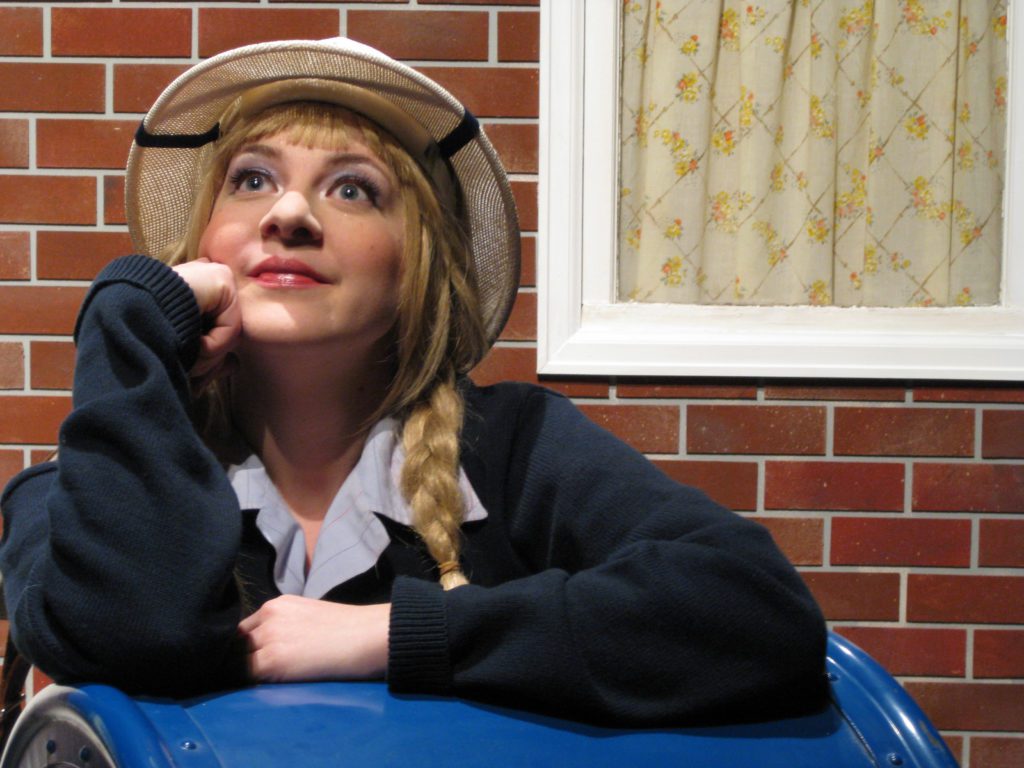
Using the post office as a central metaphor for mankind’s interconnectedness, Seal. Stamp. Send. Bang. follows four different protagonists through an “ordinary” day. (more…)
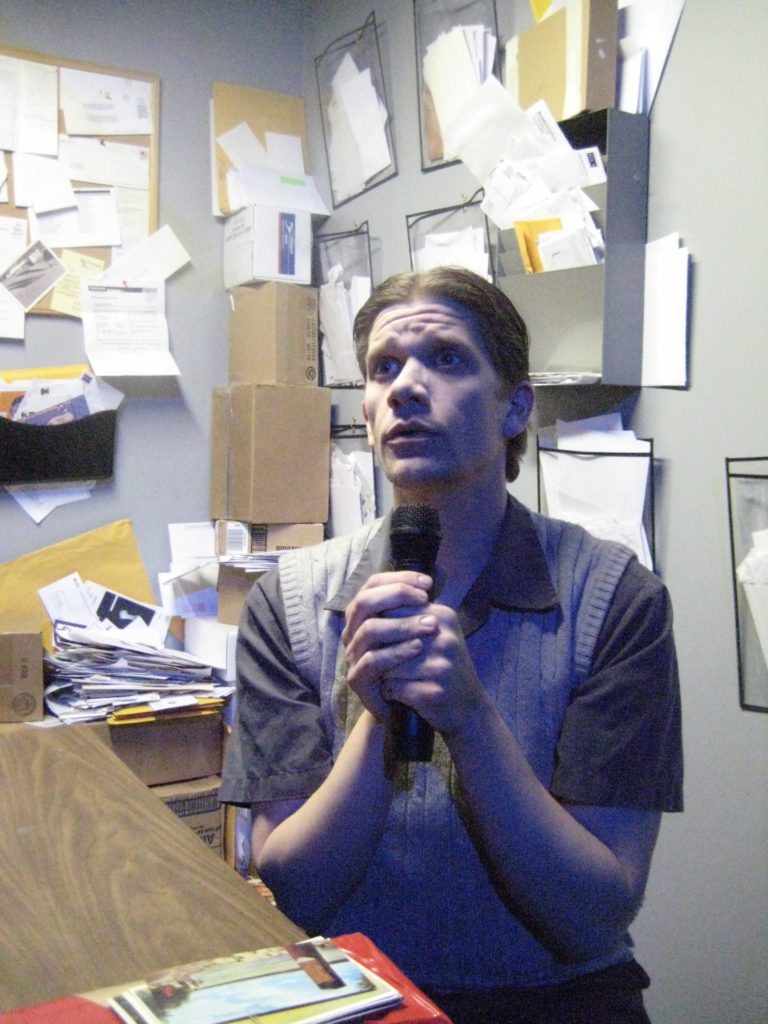
Don’t underestimate the silly.
Done well, silly is of inestimable value (although I will try to estimate it herein). And at the top of their game, nobody does silly like Buntport Theater Company.
Seal. Stamp. Send. Bang. reveals the musical theater talents of the troupe’s five performers, who are a) fair to middling and b) brilliant. As always, they work in collaboration with Samantha Schmitz, who does bang-up technical and design work here.Their 25th original piece (can we just bow down to that achievement for a moment, please?) is, of all things, a musical. A synth-pop, ’80s-inflected, joyous story of lonely lives intersecting via the absurdity of the U.S. Postal Service.
Of course, it doesn’t help to catch the first 30 minutes of American Idol (fixed, I tell you, fixed!) before heading over to the theater. Five minutes and several missed notes in, my brain was showing the hand to Simon Cowell and telling him to stop being so mean. Because, despite the fact that none of these performers are gifted singers – a fact they cop to in the program – all of them have pleasant voices. More important, they know how to put over a song. Because they are, first, actors, and they get that singing a song is telling a story. They get an invaluable boost from Adam Stone, who wrote music and lyrics that are both catchy and clever, acknowledging musical theater conventions (check out that 11 o’clock number at 9:15) but not falling off the cliff of parody as so many recent musicals do.
Erin Rollman’s Susan is a blond-braided mail carrier, licking her wounds from her divorce and oblivious to the besotted Pete (Evan Weissman, who takes on three fully realized roles here), who drops unaddressed postcards into the mail in the hope that she’ll hear his words of love. Seal. Stamp. Send. Bang. is full of loopy interconnections of the Seinfeld sort, as diabetes, postcards and Tennyson crop up in unexpected places. It all plays out on the street of neatly crafted home fronts and Astroturf lawns, where each home spins around to reveal a mail truck, a deathly fluorescent office and home interiors.
Pete, the neighbor, responds to his mail carrier’s presence with the most ludicrous of love songs, singing:
I know you’re fragile
I’d handle you with care
Package you with peanuts
And bubble wrap your hair
Meanwhile, sad, strange Jason (Erik Edborg) is trapped in the dead-letter office, a soulless room out of Office Space where he spends his days trying to divine the source of dead letters, until a sadistic postal inspector (Brian Colonna, truly maniacal) shows up with questions and an electric-shock dog collar.
When he goes home, he finds his cousin, or sort of his cousin. No one quite knows, as evidenced in a riotously funny patter (edging on rap) song in which the two argue over how they are related. It’s also one of the best-staged songs; I only wish there had been more choreography from this group’s strange collective imagination. As the cousin, Hannah Duggan gets the night’s biggest laughs, beginning with her demented grunts and culminating in an entire song sung from the inside of a cardboard box. The idea that theater has lasted 3,000 years without a cardboard box singing and dancing onstage is criminal at the very least.
There’s no message to take away here. Even the bittersweet is mostly sweet. What you get, though, is a 75-minute, fully realized musical (the score is tracked) – and, for an extra $10, you can take home your own original cast recording.
—Lisa Bornstein, March 6, 2009, IWantMyRocky.com